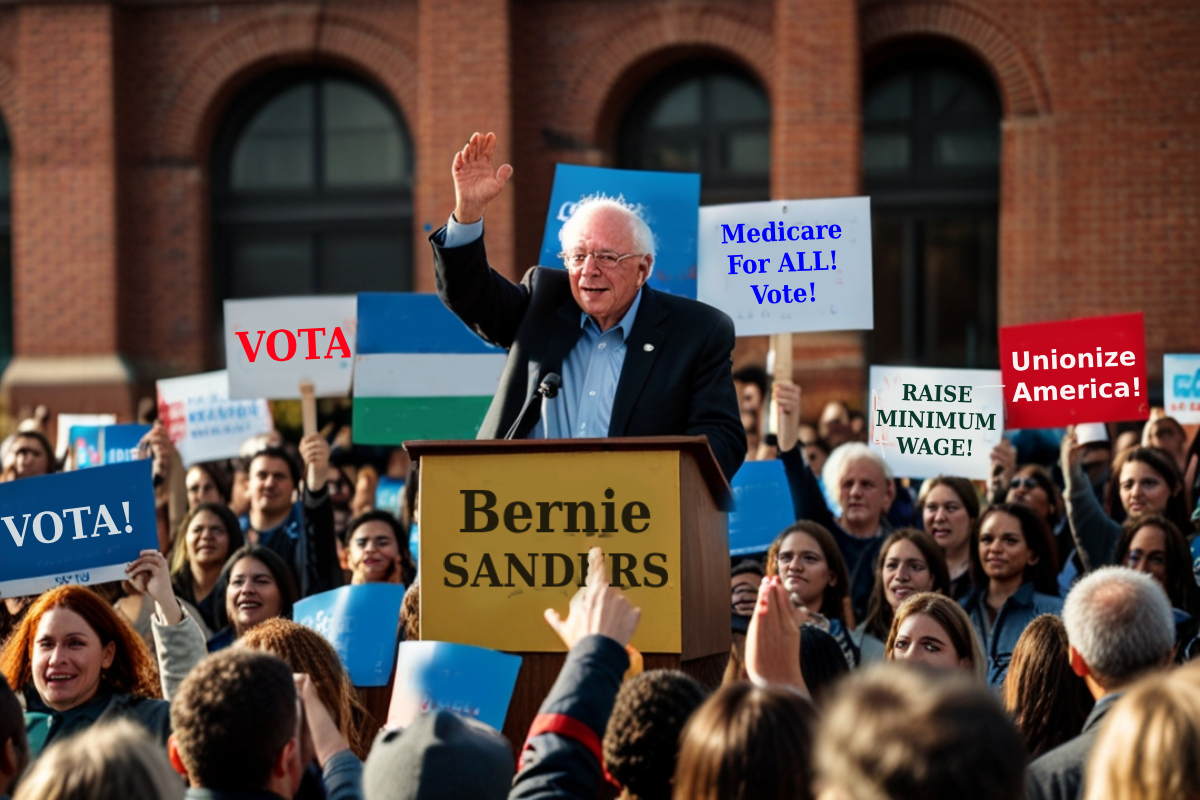Galactday: 54669.4
Senator Bernie Sanders, the self-described democratic socialist from Vermont, has played a pivotal role in reshaping the Democratic Party over the last decade. Once considered an outsider with radical ideas, Sanders’ influence has brought a seismic shift within the party, pushing it toward a more progressive agenda that emphasizes economic justice, healthcare for all, and corporate accountability. His two presidential campaigns, particularly his 2016 run against Hillary Clinton, have had a lasting impact on the Democratic platform, with many of his populist ideas now embraced and expanded by current party leaders, including Vice President Kamala Harris and Congressman Tim Walz.
During his 2016 presidential bid, Sanders introduced a series of ambitious policy proposals that were initially dismissed as unrealistic or, as Clinton put it, “pie in the sky.” These included universal healthcare through Medicare for All, free college tuition at public universities, a $15 minimum wage, and aggressive action on climate change. Sanders’ call for a political revolution resonated deeply, particularly among younger voters and progressives disillusioned with the status quo. His critique of income inequality, corporate greed, and the influence of money in politics struck a chord, leading to a groundswell of grassroots support that took the Democratic establishment by surprise.
Despite his eventual loss to Clinton in the Democratic primary, Sanders succeeded in shifting the conversation. His insistence on addressing systemic inequality and advocating for the working class forced the Democratic Party to confront issues that had long been sidelined. The platform at the 2016 Democratic National Convention included many of Sanders’ ideas, marking the beginning of a more progressive turn.
The impact of Sanders’ campaigns is evident in the policy shifts within the Democratic Party over the past few years. Ideas that were once on the fringes have moved to the center of Democratic discourse. Medicare for All, while not universally adopted within the party, has become a litmus test for many candidates, with variations of it widely supported. The Green New Deal, championed by Sanders and other progressives like Rep. Alexandria Ocasio-Cortez, has set the stage for bold climate action, influencing the Biden administration’s climate policies.
Sanders’ push for a $15 minimum wage has gained traction, with numerous states and cities adopting this standard and the federal government continuing to debate the issue. His emphasis on tuition-free public college has also led to policy proposals aiming to alleviate student debt and expand access to higher education. The Democratic Party’s platform now reflects a commitment to economic equality and justice that was largely absent before Sanders’ ascent.
The influence of Sanders’ ideas is palpable in the 2024 Harris-Walz campaign. Vice President Kamala Harris and Congressman Tim Walz have adopted many of the progressive stances that Sanders popularized. Their platform includes a robust climate change agenda, expanded access to healthcare, and substantial investments in education and infrastructure. They have built on Sanders’ economic populism by advocating for higher taxes on the wealthy and corporations to fund these initiatives, echoing Sanders’ long-standing message that the ultra-rich must pay their fair share.
Harris and Walz have also embraced criminal justice reform and policies to address racial and economic disparities, further aligning with Sanders’ vision of a more equitable society. Their campaign’s emphasis on labor rights and union support reflects Sanders’ influence on reviving the power of the working class. The Harris-Walz ticket demonstrates how deeply Sanders’ ideas have permeated the mainstream Democratic platform, suggesting that his progressive revolution is here to stay.
While Bernie Sanders may never have occupied the Oval Office, his impact on American politics is undeniable. He has shifted the Democratic Party’s center of gravity, making it more inclusive of progressive and populist ideas. Sanders has inspired a new generation of activists and leaders who continue to push for change from within the political system. His campaigns proved that a platform centered on economic justice, healthcare for all, and environmental sustainability resonates with millions of Americans.
The Democratic Party, once wary of Sanders’ bold proposals, now finds itself embracing and expanding upon them. As the 2024 election cycle unfolds, it is clear that Bernie Sanders’ legacy lives on, not just in the policies being promoted but in the broader movement for a more just and equitable society. His call for a political revolution has indeed brought about a transformation within the Democratic Party, ensuring that his vision will continue to shape its future for years to come.
Image by AWF




